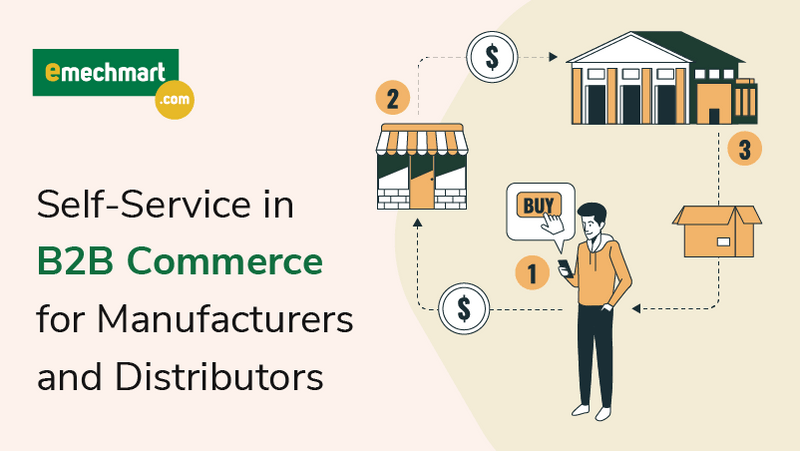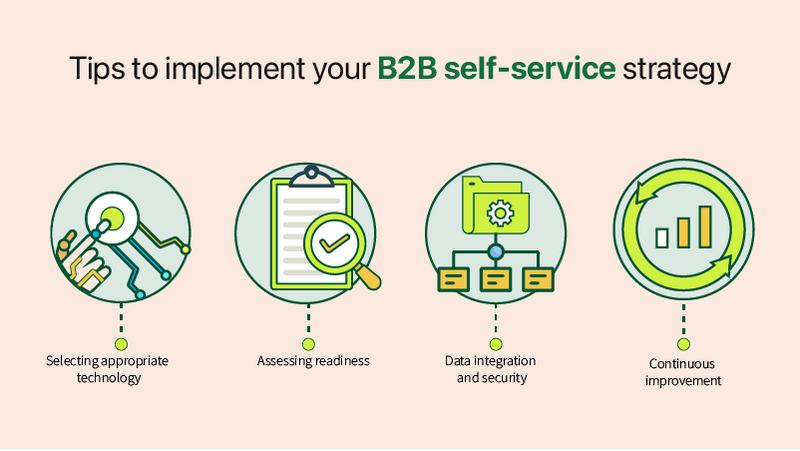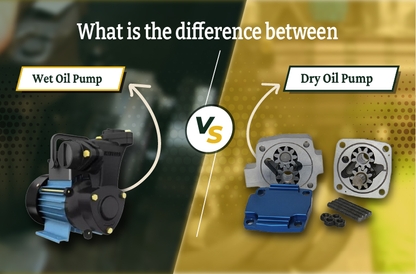Introduction
Manufacturers are not tech-savvy, but seeing the change in B2B buyer expectations and the increasing proportion of Gen-Z and millennials expecting easy and effective online self-service has led to steady growth and capital investment in manufacturing e-commerce sites.

The recent pandemic made manufacturers embrace B2B e-commerce as they can no longer use traditional selling methods. Companies are gradually realizing that their growth depends more on e-commerce sites. The shift to online buying is permanent now, and C-suite executives starving to top their business in the competition age must provide digital tools according to customers' expectations.
Plus, it is essential to note that manufacturers and distributors are getting more and more of their revenue from digital channels. According to research from DHL Express, B2B e-commerce revenue is expected to reach 20.9 trillion dollars by 2027.
If you think digital sales will disrupt your on-the-go offline sales channels, there is plenty of scope to create a new environment where they can work smoothly. It includes empowering sales professionals with mobile tablet devices to access real-time information regarding price, stock availability, customer accounts, and placing orders on their behalf.
The customers here are distributors, dealers, or direct buyers, and they expect the same level of service from a B2B e-commerce site as they receive from a consumer e-commerce site. The self-service option is mandatory as it eases the sales process, increases sales and profit margins, provides long-lasting customer relationships, and boosts brand awareness.
This article will delve into the self-service world in B2B e-commerce and explore what it entails, factors, benefits, implementation strategies, best practices, and future roadmap. Let's get started!
Factors to consider in self-service commerce
Several factors are taken into notice for self-service in e-commerce, yet we have evaluated a few of them below,
Change in buyer's expectations
B2B buyers expect the same convenience and efficiency they experience during B2C interaction. Also, they want information at their fingertips and can easily place orders and track shipments.
Technological advancements
The increasing digital advancements, including mobile devices and cloud computing, have made self-service in B2B commerce possible and practical. Integrating AI and ML algorithms into self-service platforms has enabled predictive analytics that offers B2B buyers personalized product recommendations and participation in future needs.
Competitive market
Adopting self-service in commerce has acted as a proactive strategy for manufacturers and distributors to help them stand out and ahead in the market. It differentiates from competitors by embracing self-service that aligns with the present preferences of B2B buyers seeking streamlined and efficient services.
The self-service platforms are intuitive enough to position manufacturers and distributors as industry leaders committed to meeting clients' ever-changing needs.
Benefits of self-service B2B commerce for manufacturers and distributors
Dominate online sales
Self-service e-commerce is useless if manufacturer executives resist it. Many buyers prefer digital self-service and remote human contact to in-person communication, while only a few want face-to-face sales. Usually, buyers think it is easy to get information and place orders quickly at their convenience when manufacturers provide a self-service experience.
Also, the self-service buyers are millennials who grew up with computers and technologies and are pro-using them. These are the essential things that help save their time. Meanwhile, if you don't offer the experience they want, they go to your competitors and get whatever they want.
ERP integration
ERP integration allows B2B self-service portals and ERP systems to share data quickly and in real-time. The platform and ERP solution allow the activity to be synchronized automatically with back-office operations.
For instance, a customer can see a particular product before ordering; if the item is available and they place an order, the ERP can create an invoice and update the inventory. It sends shipping notifications and tracking details to clients to track orders from purchase to delivery.
Easy account management for sales representatives
A B2B e-commerce solution makes it easy for sales representatives to do their jobs. They can access complete customer profiles that understand clients' buying patterns and tailor their sales approach.
Plus, they can check their product availability and stock levels in real-time to provide accurate information and even upsell or cross-sell items in stock during sales calls.
Increase security features
B2B purchases usually include vast amounts of money and sensitive data between manufacturers and distributors. Cybercriminals often target them. It makes B2B self-service commerce portals with robust security features like intrusion detection systems, firewalls, and secure sockets layer encryptions that protect customer data and transactions.
Boost efficiency
B2B customers want the entire buying process to be efficient. Customers benefit from features like customized search options, exact and personalized product information, online maintenance booking, and other services.
Moreover, self-service and easily accessible information reduce customers' administrative burden, low them to maintain their existing internal processes.
Now, B2B buyers don't have to depend on store openings or salespeople's availability, as the online experience is valuable because customers expect seamless service 24/7. It makes the buyer's interactions seamless with the manufacturers.
Streamlines customer interaction
The buyer's relationship with the manufacturers and distributors changes over time. The buyers can interact when they place an order, talk to a sales representative, get updates on new products, search for documentation, or ask for quotes.
Self-service in B2B e-commerce allows us to do everything in real-time from different sources like ERP, Commerce platforms, CRM, PIM, and more. It makes the buyer's interactions seamless with the manufacturers.
It makes the customer independent
The customer becomes independent regarding any purchases he makes. They can quickly sort out the issues that occurred. For instance, if a machine throws errors, they can order a spare part that is replaced quickly, or the piece may be hidden somewhere, or it can be a small part that may not exist anymore in its original form.
In such cases, the digital form of the machine comes into the picture. The customer can open their machine, which shows all the customization. The spare part that has to be changed can be viewed from the shopping basket. They can simply call a technician and show the error to be fixed themselves when the need for an account manager or time to dig into customer services is eradicated.
How can B2B commerce self-service for manufacturers and distributors also benefit customers?
Personalized customer experience
Usually, B2B buyers opt to have a personalized user experience. They wish the self-service providers to treat them as individuals and not as a wholesome audience. If the self-service e-commerce portal stores data according to customers' past orders, preferences, and browsing habits, it allows customers to get their specialized product catalogs for each customer.
Plus, it includes bulk product packs or speciality items for specific customers. This practical online self-service helps build trust and leads to customer satisfaction, solid relationships, and repeat orders.
Online catalog and product information
Online catalogs play a vital role in delivering crucial product information to buyers. The self-service e-commerce platform serves as a centralized and easily navigable with rich visuals, detailed descriptions, and technical specifications.
Also, they facilitate online catalogs with efficient product comparisons. This way, B2B buyers can analyze features, pricing tiers, and specifications to identify the best-suited products according to their needs.
The manufacturers and distributors invest in developing and optimizing online catalogs that not only facilitate self-service but rule them out for buyers' empowerment.
A well-planned and technologically advanced catalog becomes a repository of products and a strategic tool to engage customers, foster trust, and drive efficient decision-making for B2B buyers.
Customized pricing and payment terms
The foremost thing a B2B buyer searches for is pricing. It acts as a big deal for them. Thus, self-service in B2B commerce offers buyers tailored pricing and payment terms according to their profile and purchase history.
So they don't have to contact customer service to inquire about pricing whenever they want. The effective B2B e-commerce portal provides detailed product demos and relevant information for B2B buyers they might need while researching products.
Automated reminders for quick reorders
Most B2B buyers have the same list of products to buy regularly. So, they are searching for platforms that allow them to reorder items quickly.
A self-service e-commerce portal is accessible 24/7 and shows previous purchases and frequently ordered items. In this way, they can quickly place repetitive orders without searching for products or asking for help to search for customer service.
Custom order templates
B2B self-service e-commerce platforms allow users to order specific items together. For instance, a manufacturing facility regularly orders safety tools and equipment for its workforce. In this scenario, the specific items together streamline the procurement process.
A maintenance department frequently orders products like safety helmets, protective gloves, and specialized tools for daily inspection and repairs. Plus, they can also set up a bundle or kits that include all those essential items to place orders for the entire set with a single click.
Self-service knowledge base and support
B2B buyers opt for a web store where they can complete transactions remotely and connect to customer service by chat instead of calling someone. They need flexibility to buy items, check their status, and collect information anytime.
An effective online self-service portal is where you can create a detailed knowledge base with tutorials and product guides according to B2B clients. Plus, it helps them with a knowledge base, FAQs, tutorials, and product guides tailored to B2B clients.
The self-service e-commerce platforms allow them to find answers to their queries without reaching the support team. In such a way, B2B buyers can also manage their accounts, update personal details, and handle minor issues without contacting customer service. Integrating chatbots or live chat features can be done for immediate help and faster problem resolution.
How do manufacturers and distributors help B2B buyers gain more advantages with bulk ordering platforms?
Self-service in B2B commerce plays a crucial role by benefiting B2B buyers with bulk ordering. Here’s how manufacturers and distributors help buyers with efficient and effective bulk ordering.
Aligns ordering process
Self-service platforms give B2B buyers a user-friendly interface that enables a streamlined and efficient ordering process. B2B buyers can easily navigate to catalogs, add multiple items to a cart, and adjust quantities they need with an inbuilt online environment. It reduces the risk associated with large-scale purchases.
Customized catalog and price
Effective online self-service allows B2B buyers to create personalized catalogs according to their preferences. This feature is primarily for buyers of bulk product orders, as it helps curate a selection of products associated with business requirements.
In addition, self-service in e-commerce also provides a personalized pricing structure for bulk quantities to ensure transparency and accurate pricing calculation.
Automated quoting and approval process
B2B e-commerce solution automates the quoting process for bulk orders. B2B buyers can initiate instant quotes based on quantities they consider with real-time cost estimates. Plus, the platform provides an automated approval workflow to expedite the process of bulk orders by reducing the time it takes for internal reviews and approvals.
Bulk discounts and promotions
Self-service platforms are configured while placing bulk discounts and promotions automatically when certain order thresholds are needed. B2B buyers benefit from incentives that encourage them to place large orders.
This transparent feature of giving discounts on self-service platforms lets buyers make decisions for bulk purchases according to their budget.
Order tracking and visibility
B2B buyers can gain real-time status updates on their bulk orders. From confirmation of order to shipment tracking, buyers can independently monitor their entire order fulfillment process. This transparency increases their trust and confidence in self-service models, especially when dealing with significant quantities of products.
Inventory management
Self-service in e-commerce platforms consists of solid inventory management features. B2B buyers, in this case, can check product availability, monitor stock levels, and get alerts for less stock, which helps them make informed decisions while placing bulk orders. This real-time information allows them to make more accurate and strategic purchase decisions.
Flexible account management
B2B platforms include account management features to empower B2B buyers to maintain control over accounts. It includes updating billing and shipping information, managing multiple delivery addresses, and adjusting preferences for bulk orders.
Hence, it enhances the overall user experience and accommodates the dynamic needs of B2B buyers for bulk purchases, especially when buying directly from B2B manufacturers.
Tips to implement your B2B self-service strategy
A successful implementation of self-service in B2B commerce requires a well-thought-out approach. Here are some of the best strategies to consider:

Selecting appropriate technology
Select e-commerce platforms and customer relationship management systems (CRMS) according to your self-service objective. Select those tools that are scalable and adaptable as per future needs.
Assessing readiness
Before starting a self-service journey, check the organization's technological infrastructure and organizational culture. Analyze some questions. Is your team ready for a change? Do you have an IT infrastructure that supports the task? Do you have in-house experts to fulfill the requirements?
Data integration and security
Implement best data management practices and ensure strict security measures are taken to protect customer information. It is mandatory for an effective online self-service to build trust for gaining potential B2B buyers.
Continuous improvement
Collect regular feedback from buyers to make regular changes to the platform. It helps to align the future updates to be made in the platform. Remember, being agile is the key to keeping up with changing demands.
What are the future self-service B2B e-commerce trends?
The world of self-service is evolving faster, and to keep up with it, it is essential to keep an eye on emerging trends:
AI and Machine Learning
AI and machine learning use in self-service B2B commerce is not limited to personalization but is more geared toward predictive analytics. As these technologies move ahead, businesses rely on predictive algorithms to complete customers' needs, optimize product information, automate decision-making processes, and create more intuitive and anticipatory self-service experiences.
Conversely, AI-powered virtual assistants and chatbots are becoming more trendy as they help give real-time assistance to B2B buyers. The AI-driven chatbots have the potential to handle complex inquiries, guide users by self-service process, and offer proactive suggestions according to historical data.
IoT and supply chain integration
The integration of the Internet of Things - IoT has advanced beyond real-time tracking to give predictive maintenance and demand forecasts. IoT-enabled devices are embedded by-products that can communicate with manufacturers for usage patterns. It, in turn, helps in proactive maintenance and better inventory planning. Due to this, the supply chain dynamics are redefined to help create more responsive and agile systems.
Plus, the integration of IoT in B2B self-service increases the visibility of goods throughout the entire supply chain. It enhances transparency, helps businesses make more informed decisions, reduces lead time, and improves overall supply chain efficiency.
Blockchain for transparency and security
Blockchain implements smart contracts on its platform to automate and enforce contractual agreements. It helps reduce the risk associated with disputes and enhances the efficiency of self-service processes.
Moreover, it facilitates cross-border transactions, providing a secure and transparent framework for international B2B e-commerce solutions. The compact nature of blockchain ensures that no single entity controls the entire network by fostering trust and reducing the risk of fraud.
Sustainable and eco-friendly practices
Self-service in B2B commerce allows manufacturers and distributors to make environmentally oriented choices like selecting suppliers with green certifications or choosing products with fewer carbon footprints.
Additionally, due to increased sustainability, self-service platforms can integrate tools for tracking and reporting the environmental impact of purchases. It helps businesses to plan eco-friendly practices for the entire supply chain process.
How do you create your B2B commerce self-service roadmap?
If the manufacturers and distributors enable self-service for B2B buyers, it becomes their first and foremost step of the digital journey. You can start creating your B2B e-commerce roadmap according to your business type by focusing on specific segments or stages of the customer lifecycle.
You can customize your roadmap according to specific business benefits. It will help reduce customer service inquiries regarding order status, reordering or billing with real-time information that business system integrations will provide.
In addition, the speed of your quote-to-cash process increases profitability with round-the-clock self-service. Many such features would help manufacturers and distributors streamline their self-service in e-commerce.
Conclusion
Self-service in e-commerce has no longer become a luxury but is necessary for manufacturers and distributors to thrive in the digital era. The self-service platform offers businesses an unparalleled customer experience by reducing costs, giving valuable insights, and helping them stay ahead of market competition.
In addition, B2B e-commerce solutions provide personalized services available 24/7 to all clients. It can help reduce not only the load time of your customer service team but also the waiting time of customers. Hence, B2B self-service commerce portals help manufacturers and distributors reduce their load time by giving a seamless experience to B2B buyers.
Increase your purchase experience – explore self-service solutions with us!



